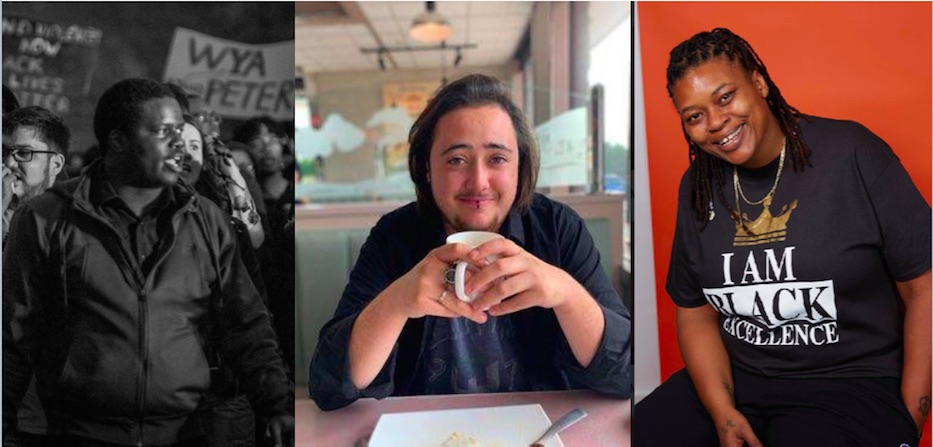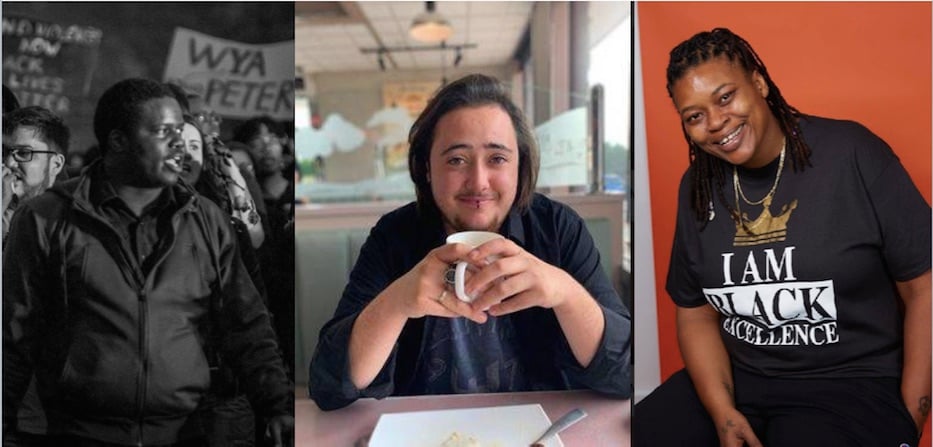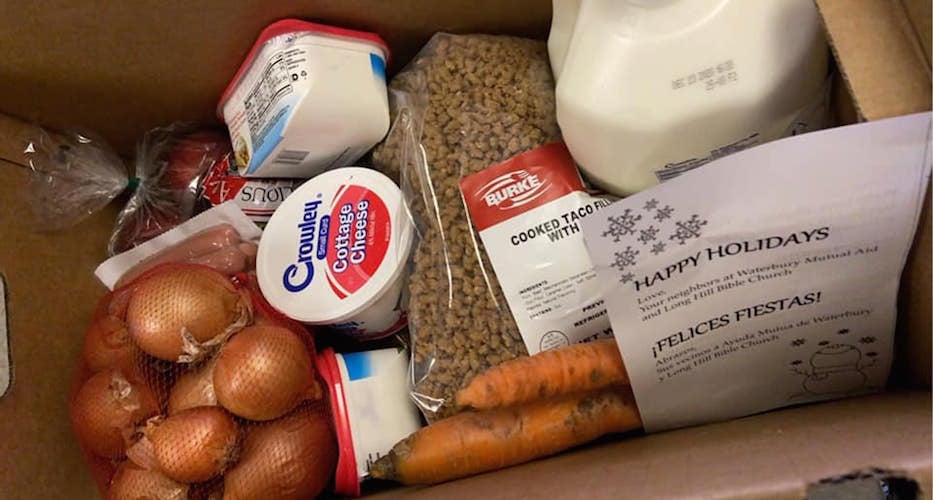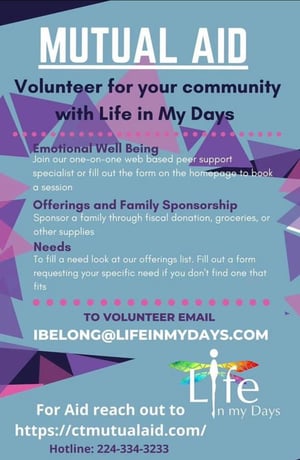
Culture & Community | Immigration | LGBTQ | COVID-19 | Mutual aid

From left to right: Life In My Days Community Organizer Jamarr Jabari, Director of Development Eliot Olson, and Director of Mutual Aid MiAsia Harris. All have been working to provide and expand statewide aid for months. Photos Courtesy of Jabari, Olson, and Harris.
Rosalyn Forant was working as a peer recovery specialist when Covid-19 arrived in New Haven. After losing her job, she started asking for help—and found a new network of statewide mutual aid groups that are helping her make it through a long and cold winter.
Forant is one of hundreds of Connecticut residents who have used CT Mutual Aid, a centralized hub that has grown out of social media efforts and mutual aid work across the state. Launched by Life In My Days and run by a crew that includes musicians, spoken word artists, computer nerds and photojournalists, the initiative seeks to bring together mutual aid groups in the midst of high unemployment, food insecurity, and a growing statewide eviction crisis.
The organization is currently in the midst of a fundraising appeal to continue and expand its work to a community-oriented housing network. Partners include Waterbury Mutual Aid, Bridgeport Mutual Aid, Norwalk Mutual Aid, and New London Mutual Aid among others.
“This is especially relevant right now because of Covid,” said Eliot Olsen, director of development with Life In My Days. “We are all struggling in our own way, but we already have parts of our community that were struggling before the pandemic, and when Covid hit, it exacerbated what was already there.”
Initially, the CT Mutual Aid hub grew out of a need that organizers saw in March 2020, as shutdowns rippled across the state. People were losing their jobs, and with it their ability to meet basic needs. Sometimes they were looking for a meal, or groceries to get their family through the week. Others, they needed clean diapers and safe transport to medical appointments.

A box of food that organizers distributed around the holidays. CT Mutual Aid Facebook Photo.
Life In My Days launched a Facebook page where community members could post their needs—sometimes as simple as a Venmo transfer or as complicated as short- and longer-term housing—and respond in real time. It started at the same time as parallel mutual aid efforts across the state, many of which have continued through month 11 of the pandemic.
To food, toiletries, and financial assistance, organizers soon saw requests come in for back rent and secure housing. Olson noted that need has skyrocketed among those who were vulnerable to food and housing insecurity before Covid-19. In Connecticut, that includes Black and Latinx people, undocumented immigrants, people with dealing with unsafe home situations, and members of the LGBTQ+ community. Often, people live at the intersection of many of those identities at once.
“What drives me in doing this work is, when it comes to the bottom line, we can’t just watch someone drown,” Olson said. “And I truly hope that is the case for humanity. Because I’m not sure where it leaves us if it’s not. And this is kind of a test right now.”
Almost a full year into the pandemic, that Facebook page has grown to encompass a social services oriented website, coordinated social media outreach, and phone line, where the intake process is meant to be streamlined and localized. In the absence of an office, staff stay in touch with a Slack channel and a backend that makes tickets for each need, then matches needs with services that community members have offered.
Currently, Life In My Days is raising funds to expand that work to housing. Its “We Shelter Us” campaign will add secure housing as a ticket item, and then link those needs with open emergency housing. It is modeled partly on the Trans Housing Network.

IV Staklo, board president with Life In My Days, said that each emergency housing opportunity is vetted for trans and immigrant safety. The push comes as landlords find loopholes in Connecticut’s eviction moratorium, which is set to expire April 20. Already, tenants are being evicted if they cannot pay six or more months of back rent due on or after March 1 of last year.
“We need to take care of each other right now,” Olson said. “Not only because of the pandemic. But it’s winter! It’s winter during Covid! Housing is a huge issue right now, and it’s only going to become bigger when the rent moratorium ends.”
Director of Mutual Aid MiAsia Harris, who is based out of New Haven and works to itemize and fulfill each ticket, said the need never stops. She’s seen the type of request change on a case by case basis—one of the reasons that the intake form is so important. In addition to the website, she uses social media to source offerings from the community.
“We are definitely reaching people,” she said. “Behind the scenes, I’m doing the techie part, as far as putting people’s information into the system and seeing exactly what they need or what they can offer, and whatever location they live in.”
The work comes at a critical time. Last year, Forant was working as a peer recovery support specialist at the Park Street Inn, a position that was designed and grant funded for in-person work. After Gov. Ned Lamont announced shelter-in-place orders, she lost her job. She first saw a flyer with the mutual aid website and phone number while waiting for the bus on Whitney Avenue.
“I was struggling really badly financially,” she said. “They stepped in and have provided pretty much everything. Food, helping me with my bills, they have provided helping me with assistance.”
She praised the CT Mutual Aid team for food drop offs and direct financial assistance, as well as an attempt to find her a new bed after a bedbug problem in her home. After losing her job last spring, Forant also opened her home to her sister, who is facing housing insecurity. The aid means it’s easier for her to make ends meet.
From Bridgeport, Kacy Rivera also commended the group for providing aid on a regular basis. Prior to last March, Rivera was working as a personal care assistant while also taking care of her parents and two of her six children. Even before a global pandemic, it was a delicate balancing act: her mother is battling cancer and short-term memory loss. Her father is disabled.
When Covid-19 hit, she had to quit her jobs to take care of them full time. She said that food security was her most immediate concern, and has been grateful to CT Mutual Aid for grocery deliveries that come every few weeks. Because she is watching her mother much of the time, she’s unable to go to emergency food providers herself.
“It’s an amazing thing,” she said. “It’s actually convenient for a lot of people, especially when you feel down and like there’s no place to go. There are actually people out there that can help you and provide you with decent information.”
Jamarr Jabari, a community organizer with Life In My Days, said that he sees mutual aid work as an extension of the organization’s mission, and specifically a focus on “belonging, equity, self-actualization, and transformation.” When he came to Life In My Days, it was to coordinate a series of open mics and art exhibitions, which have since gone virtual due to Covid-19. Last month, he was organizing a meeting with statewide mutual aid networks instead.
As an artist himself, he said that he sees it as two parts of the same whole. He recalled a situation a few weeks ago, in which a family was fighting eviction during the first heavy snow of the season. He bristled every time he heard or saw someone suggest that they could just find a job to cover back rent.
“We’re so quick to judge a situation,” he said. “These are working class struggles. It could be you, any second. It could be you.”
Visit CT Mutual Aid's website here. Life In My Days is taking donations via PayPal (ibelong@lifeinmydays.com), Venmo at @LifeinMyDays and Donorbox. Listen to a recent WNHH Community Radio interview with Eliot Olson and Jamarr Jabari above.

